Hyundai Tucson vs Mercedes B Class - Differences and prices compared
Compare performance (288 HP vs 238 HP), boot space and price (20900 £ vs 33100 £ ) at a glance. Find out which car is the better choice for you – Hyundai Tucson or Mercedes B Class?
Costs and Efficiency:
Looking at overall running costs, both models reveal some interesting differences in everyday economy.
Hyundai Tucson has a convincingly advantage in terms of price – it starts at 20900 £ , while the Mercedes B Class costs 33100 £ . That’s a price difference of around 12232 £.
Fuel consumption also shows a difference: Mercedes B Class manages with 2.50 L and is therefore slight more efficient than the Hyundai Tucson with 2.70 L. The difference is about 0.20 L per 100 km.
As for electric range, the Mercedes B Class performs to a small extent better – achieving up to 83 km, about 13 km more than the Hyundai Tucson.
Engine and Performance:
Power, torque and acceleration say a lot about how a car feels on the road. This is where you see which model delivers more driving dynamics.
When it comes to engine power, the Hyundai Tucson has a slightly edge – offering 288 HP compared to 238 HP. That’s roughly 50 HP more horsepower.
In acceleration from 0 to 100 km/h, the Mercedes B Class is slightly quicker – completing the sprint in 6.50 s, while the Hyundai Tucson takes 7.50 s. That’s about 1 s faster.
In terms of top speed, the Mercedes B Class performs a bit better – reaching 250 km/h, while the Hyundai Tucson tops out at 204 km/h. The difference is around 46 km/h.
There’s also a difference in torque: Mercedes B Class pulls to a small extent stronger with 450 Nm compared to 379 Nm. That’s about 71 Nm difference.
Space and Everyday Use:
Whether family car or daily driver – which one offers more room, flexibility and comfort?
Both vehicles offer seating for 5 people.
In curb weight, Mercedes B Class is minimal lighter – 1405 kg compared to 1542 kg. The difference is around 137 kg.
In terms of boot space, the Hyundai Tucson offers distinct more room – 620 L compared to 455 L. That’s a difference of about 165 L.
In maximum load capacity, the Hyundai Tucson performs slightly better – up to 1799 L, which is about 259 L more than the Mercedes B Class.
When it comes to payload, Mercedes B Class slight takes the win – 550 kg compared to 545 kg. That’s a difference of about 5 kg.
Who wins the race in the data check?
The Hyundai Tucson shows small but noticeable advantages in the objective data comparison.
This result only shows which model scores more points on paper – not which of the two cars feels right for you.
Costs and Consumption
View detailed analysis
Engine and Performance
View detailed analysis
Dimensions and Body
View detailed analysis

Hyundai Tucson
Hyundai Tucson
Hyundai Tucson marries bold, sculpted looks with a clever, roomy cabin that feels smarter than its price tag suggests. It's composed on the road, easy to live with day-to-day, and a sensible choice for buyers who want SUV style without the showroom theatrics.
details




Mercedes B Class
The Mercedes B-Class is a smart, grown-up compact people carrier that dresses everyday practicality in a near‑premium polish, perfect for buyers who want comfort and a classy badge without the theatrics. It won’t set your pulse racing on a back road, but it will make school runs, commutes and grocery hauls feel pleasantly civilized — a reliable, slightly posh companion for real life.
details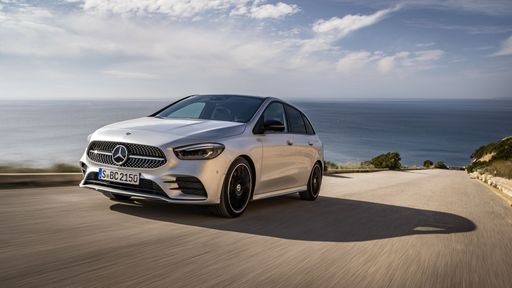
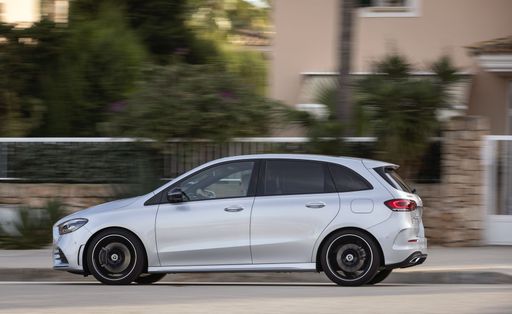
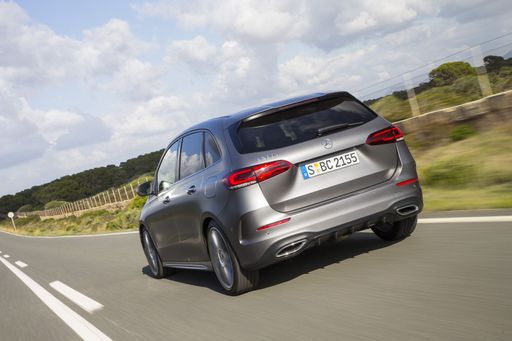
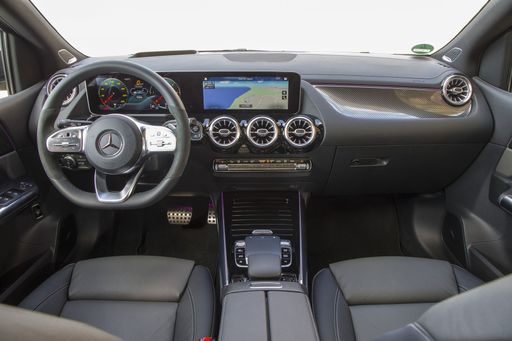
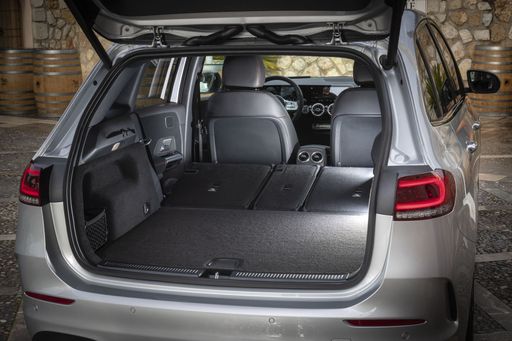
Costs and Consumption |
|
|---|---|
|
Price
20900 - 47900 £
|
Price
33100 - 52500 £
|
|
Consumption L/100km
2.7 - 7.6 L
|
Consumption L/100km
2.5 - 6.9 L
|
|
Consumption kWh/100km
-
|
Consumption kWh/100km
-
|
|
Electric Range
63 - 70 km
|
Electric Range
83 km
|
|
Battery Capacity
-
|
Battery Capacity
12.90 kWh
|
|
co2
62 - 172 g/km
|
co2
56 - 156 g/km
|
|
Fuel tank capacity
52 - 54 L
|
Fuel tank capacity
35 - 51 L
|
Dimensions and Body |
|
|---|---|
|
Body Type
SUV
|
Body Type
MPV
|
|
Seats
5
|
Seats
5
|
|
Doors
5
|
Doors
5
|
|
Curb weight
1542 - 1893 kg
|
Curb weight
1405 - 1745 kg
|
|
Trunk capacity
546 - 620 L
|
Trunk capacity
405 - 455 L
|
|
Length
4525 - 4535 mm
|
Length
4419 mm
|
|
Width
1865 mm
|
Width
1796 mm
|
|
Height
1650 mm
|
Height
1562 mm
|
|
Max trunk capacity
1795 - 1799 L
|
Max trunk capacity
1440 - 1540 L
|
|
Payload
518 - 545 kg
|
Payload
505 - 550 kg
|
Engine and Performance |
|
|---|---|
|
Engine Type
Petrol, Full Hybrid, Plugin Hybrid, Diesel MHEV
|
Engine Type
Plugin Hybrid, Petrol MHEV, Diesel
|
|
Transmission
Manuel, Automatic
|
Transmission
Automatic
|
|
Transmission Detail
Manual Gearbox, Dual-Clutch Automatic, Automatic Gearbox
|
Transmission Detail
Dual-Clutch Automatic
|
|
Drive Type
Front-Wheel Drive, All-Wheel Drive
|
Drive Type
Front-Wheel Drive, All-Wheel Drive
|
|
Power HP
136 - 288 HP
|
Power HP
116 - 238 HP
|
|
Acceleration 0-100km/h
7.5 - 11.6 s
|
Acceleration 0-100km/h
6.5 - 10 s
|
|
Max Speed
196 - 204 km/h
|
Max Speed
200 - 250 km/h
|
|
Torque
250 - 379 Nm
|
Torque
200 - 450 Nm
|
|
Number of Cylinders
4
|
Number of Cylinders
4
|
|
Power kW
100 - 212 kW
|
Power kW
85 - 175 kW
|
|
Engine capacity
1598 cm3
|
Engine capacity
1332 - 1991 cm3
|
General |
|
|---|---|
|
Model Year
2025
|
Model Year
2024 - 2025
|
|
CO2 Efficiency Class
F, D, E, B
|
CO2 Efficiency Class
B, D, E, F
|
|
Brand
Hyundai
|
Brand
Mercedes-Benz
|
What drive types are available for the Hyundai Tucson?
Available configurations include Front-Wheel Drive or All-Wheel Drive.




